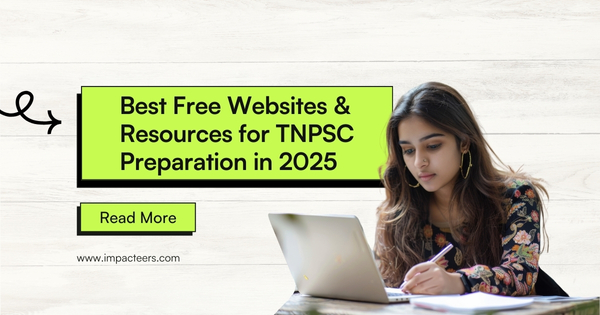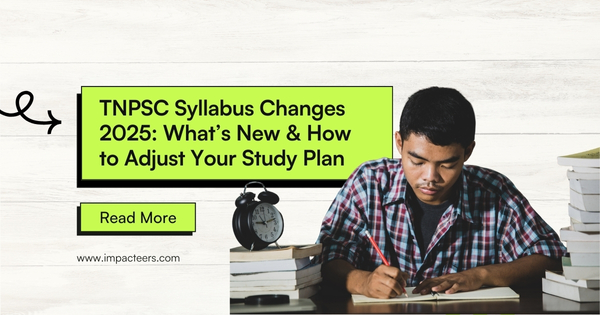Avoid UPSC preparation mistakes made by first-time UPSC aspirants. Learn proven strategies for syllabus coverage, book selection, prelims prep, and mains answers. Enhance your UPSC 2025 result with Impacteers Skill Assessment.
Every year in India, lakhs of first-time candidates register for the UPSC Civil Services Exam, hoping to become an IAS, IPS, or IFS officer. While the enthusiasm is inspiring, a large portion of these aspirants make avoidable mistakes that cost them dearly—sometimes, the entire year of preparation.
If you’re preparing for UPSC Prelims 2025 as a first attempt, this blog is your warning bell and roadmap combined. We’ve analyzed experiences of toppers, mentors, and even failed attempts to bring you the most common mistakes and UPSC preparation mistakes first-time aspirants make—paired with strategies and tools like Impacteers Skill Assessment that help course-correct before it’s too late.
Visit Us >>> https://www.impacteers.com/home
1. Starting Without Understanding the UPSC Syllabus
Mistake:
Jumping straight into books or coaching classes without reading the UPSC syllabus thoroughly.
Why It Hurts:
You study irrelevant topics, ignore key areas, and fail to connect questions with themes.
Fix:
Download the official UPSC syllabus. Paste it near your study space. Refer to it before and after every topic you study.
2. Following Too Many Books and Sources
Mistake:
Reading 4 different books on Indian Polity or downloading 20 current affairs PDFs.
Why It Hurts:
You gather information but build no clarity. Plus, you can’t revise it all before the exam.
Fix:
Stick to a minimalist booklist:
- Polity: Laxmikanth
- Economy: Sriram notes or NCERTs
- History: Spectrum + NCERTs
- Geography: GC Leong + NCERTs
- Environment: Shankar IAS
- Current Affairs: One monthly source (e.g., Vision or Impacteers)
3. Ignoring the UPSC Exam Pattern and Question Types
Mistake:
Not solving previous year question papers (PYQs) or understanding how UPSC frames options and statements.
Why It Hurts:
You don’t develop elimination skills, fall for traps, or fail to understand what UPSC really asks.
Fix:
Solve at least 7–10 years of UPSC prelims and mains questions. Use them to guide your revision and MCQ practice.
4. Underestimating the Importance of CSAT
Mistake:
Assuming CSAT is easy because you’re good at math or English.
Why It Hurts:
Thousands fail prelims each year just because they didn’t qualify CSAT, despite scoring well in GS Paper I.
Fix:
Start CSAT prep 2–3 months before prelims. Practice reasoning, comprehension, and numeracy 3–4 times weekly.
5. Not Practicing Answer Writing Early Enough
Mistake:
Focusing only on prelims and ignoring mains answer writing until after the prelims result.
Why It Hurts:
You won’t have time to learn mains structure, intro-conclusion skills, or how to write under time pressure.
Fix:
Start practicing answer writing after 3–4 months of GS preparation. Begin with one question daily. Use real PYQs and have your answers reviewed via mentorship or tools like Impacteers Skill Assessment.
6. Poor Time Management and No Study Schedule
Mistake:
Random studying based on mood or topic interest, without a daily or weekly plan.
Why It Hurts:
You miss coverage, skip revisions, and panic near the exam when you realize how much is left.
Fix:
Create a flexible but clear weekly schedule with:
- 6–8 hours/day
- GS + optional + current affairs slots
- Weekly targets
- Monthly revisions
7. Neglecting Optional Subject Selection and Preparation
Mistake:
Choosing an optional based on trends or toppers, not on interest or background.
Why It Hurts:
You’ll struggle to write answers, waste months trying to understand it, and end up with poor mains scores.
Fix:
Choose optional based on:
- Interest
- Academic familiarity
- Syllabus overlap with GS
- Availability of resources
Use Impacteers Skill Assessment to map your strengths and compare scoring trends.
8. Relying Too Much on Coaching or YouTube
Mistake:
Attending 7–8 hours of classes a day and skipping personal study or revision.
Why It Hurts:
You become a passive learner. UPSC demands active recall, not passive notes collection.
Fix:
Use coaching/video lectures as a guide, not a crutch. Spend at least 60% of your time on self-study and writing.
9. Not Revising What You’ve Already Studied
Mistake:
Continuously studying new topics without revisiting old ones.
Why It Hurts:
By the time the prelims exam arrives, you forget most of what you studied earlier in the year.
Fix:
Follow the 3-Revision Rule:
- Revise each topic within 1 week.
- Again within 1 month.
- Final revision before the exam.
10. Lack of Mock Test Practice
Mistake:
Saving mock tests until “the syllabus is complete.”
Why It Hurts:
You never develop question-solving strategy, time management, or accuracy tracking.
Fix:
- Start sectional mocks after 2–3 months.
- Begin full-length prelims tests by Jan–Feb 2025.
- Analyze test performance. Use error logs.
- Include Impacteers’ targeted test series for real-exam simulations and question-level analytics.
11. Ignoring Mental Health and Burnout Signs
Mistake:
Studying 12+ hours daily without breaks, social interaction, or reflection.
Why It Hurts:
You burn out by April or May. You lose focus, sleep, and eventually confidence.
Fix:
- Follow a sustainable 8–10 hour schedule.
- Sleep 7+ hours.
- Take micro-breaks, weekend walks, journal your progress.
- Join peer communities for discussion and motivation.
12. Not Having a Backup Plan or Career Awareness
Mistake:
Putting all hopes on UPSC without considering alternate career paths or plans after the exam.
Why It Hurts:
It adds emotional pressure and anxiety if results don’t go your way.
Fix:
Be realistic. Use career assessment platforms and skill-mapping tools. Impacteers Skill Assessment not only helps with UPSC performance but also builds your awareness of skills useful in allied careers—policy, governance, teaching, development sector, and more.
Most aspirants repeat common UPSC preparation mistakes, and avoiding these UPSC preparation mistakes can greatly improve your chances of success.
Conclusion
Every mistake mentioned above is avoidable—but only if you’re aware of it early on. As a first-time UPSC aspirant, your biggest strength is freshness and enthusiasm. But those can turn into weaknesses without proper direction.
Keep your focus clear, follow a smart booklist, revise regularly, practice answer writing early, and don’t let coaching overwhelm you. Most importantly—seek honest feedback.
The Impacteers Skill Assessment tool offers what first-timers really need: clarity, correction, and confidence. It doesn’t just point out errors—it helps you improve your performance in a way that aligns with UPSC’s evolving demand.
Start strong. Finish stronger. And make your first attempt your last.
About Us >>>> https://blog.impacteers.com/
Frequently Asked Questions (FAQs)
1. Is it possible to crack UPSC in the first attempt?
Absolutely. Many toppers clear UPSC in their first attempt, especially with focused prep, strategy, mock practice, and structured skill assessment like those offered by Impacteers.
2. What is the most common mistake first-time UPSC aspirants make?
Starting without understanding the syllabus or UPSC exam pattern. This leads to poor planning, wrong book choices, and wasted effort.
3. Should I do mains answer writing from the first month?
Not immediately. Begin after you’ve studied 50–60% of GS basics. Writing 1–2 answers daily from month 3 onward is ideal.
4. How many hours should a first-time UPSC aspirant study daily?
Aim for 6–8 quality hours consistently. If you’re working, 4–5 hours with weekend boosts works too.
5. How can Impacteers Skill Assessment help me in my first UPSC attempt?
It identifies gaps in answer writing, time management, conceptual clarity, and gives you data-driven feedback to upgrade your strategy in real-time. A must for serious first-timers.




Post Comment